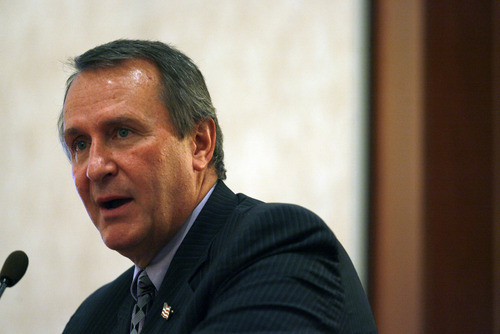This is an archived article that was published on sltrib.com in 2012, and information in the article may be outdated. It is provided only for personal research purposes and may not be reprinted.
Washington • Internet giants are clashing with Hollywood celebrities and major retailers over legislation that would make it easier to shut down sites for online piracy. And Utah Attorney General Mark Shurtleff has picked sides.
He argued in a Salt Lake Tribune opinion piece last weekend http://bit.ly/ynecnK that a tough enforcement bill is needed to protect consumers, entertainers and businesses.
"It will take a strong, sustained effort to stop Internet thieves and profiteers," Shurtleff wrote.
Actually, Shurtleff didn't write that. And other lines in his op-ed didn't come from him either. They were plagiarized from a news release and columns written by supporters of the Stop Online Piracy Act, or SOPA.
Opponents of the legislation first identified the lifted passages and noted the irony of a law enforcement officer fighting the misappropriation of others' work by misappropriating others' words.
But Shurtleff denies he plagiarized anyone, arguing it is common practice for public officials to get help writing speeches and opinion pieces, though he doesn't deny that some sentences were lifted word for word from other sources.
"Could some quotes be put around those certain issues? Yeah. Is it plagiarism? No," Shurtleff said. "People are reciting words all the time."
And he said the accusations of plagiarism are a "disingenuous" attempt to undercut his political point by "people interested in piracy."
The attorney general said he was approached by a SOPA supporter who asked him to write an editorial and later offered some text as a starting point. Shurtleff then topped that material with his experiences in Utah.
He said he didn't know that some of the passages were lifted directly from a Motion Picture Association of America news release from 2010 http://bit.ly/zBPRKW or an online column written by Mike McCurry, http://bit.ly/dVaqFC a former White House press secretary who now works with Arts+Labs, a group supporting the legislation.
TorrentFreak, http://bit.ly/xFaXtn the blog that first posted the plagiarism allegations on Tuesday, and Max Kielt, an Ontario-based graphic designer who brought it to the attention of The Tribune, accuse Shurtleff of letting the Motion Picture Association write parts of his column.
But Shurtleff refused to say who provided him with the text, calling it "irrelevant."
This is not the first time Shurtleff has received attention for relying on others' work and calling it his own. In 2010, he appeared before a House Judiciary Committee hearing in Washington to testify in support of legislation that would cede control of liquor sales to states.
Part of his testimony was written by Paul Pisano of the National Beer Wholesalers Association.
The MPAA news release that Shurtleff's op-ed plagiarizes is attributed to Bob Pisano.
Shurtleff says he knows Paul Pisano well, but was unfamiliar with Bob. It is unclear at this time if the two men are related.
The Tribune editorial page added an editor's note Friday to the opinion piece online, noting that the authorship of some of the content had been called into question.
"I believe it's clear that, knowingly or unknowingly, the attorney general included sentences in his op-ed that not only weren't written by him, but were lifted verbatim and without attribution from other published material," Editorial Page Editor Vern Anderson said. "In my book that's plagiarism and represents either negligence or misrepresentation on the part of the attorney general. I regret that readers of the Opinion section were misled."
The op-ed is part of a high-profile lobbying campaign waged by some of the nation's best-known companies. Google and Facebook are leading a large group of Internet companies in opposition to the bill that's heavily supported by movie and music companies and drugmakers.
Shurtleff isn't the only high-profile Utahn to call for more online controls. Utah Sens. Orrin Hatch and Mike Lee voted for similar legislation when it came before the Senate Judiciary Committee, though they both signed a letter sent Friday asking for the Senate to slow consideration of the bill to resolve some disputes over its language.
But Rep. Jason Chaffetz, R-Utah, is opposing SOPA, saying it is "not ready for prime time."
While he agrees that Congress should do more to stop online piracy, he worries that this bill could hurt cyber-security and run into First Amendment problems. The legislation would allow the government to block sites that enable piracy and would impose stringent criminal penalties for those involved.
"These bills do surgery on the Internet and yet they haven't talked to a doctor," said Chaffetz, who has asked for more testimony from experts about the technical implications of the bill.
The House Judiciary Committee is scheduled to resume debate on Wednesday, though some are expecting it to be delayed.
Shurtleff says if Chaffetz has a problem with the bill, then he should propose changes that make it palatable. He doesn't buy concerns that enforcement of the bill could infringe on free speech.
"Your free speech ends when you are ripping somebody off," he said.
Twitter: @mattcanham



